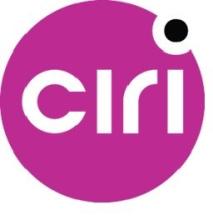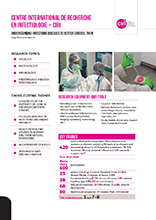
“Decoding fundamental host-microbe interactions to better control infectious diseases !” is the motto of the Centre international de recherche en infectiologie, the CIRI!
CIRI was created on 1st January 2013 by the Inserm, CNRS, ENS Lyon and University Claude Bernard Lyon 1. Along with these trustees and with its other partners, i.e., the Institut Pasteur, the Fondation Mérieux and the Hospices Civils de Lyon, the CIRI comprises over 20 teams behind one goal: the fight against infectious diseases, the second cause of death worldwide. Through a multidisciplinary approach combining microbiology (bacteriology and virology), immunology, cell biology, clinical research and epidemiology, plus a strong interface with the industry, the CIRI intends to be a research center opened to therapeutic innovation and to act a major player in the areas of medical prevention and treatment of infectious diseases.
The CIRI currently includes nearly 300 researchers, faculty members, graduate students, engineers and technicians in ca. twenty teams that have been enrolled because of their strong expertise in key basic disciplines for the study of infectious diseases (i.e., microbiology, immunology and cell biology) and also of their capacity or specific interest to translate novel knowledge, of scientific or technological nature, in translational research programs and applied research. It is a joint research Unit (INSERM U1111 – CNRS UMR5308 – ENS Lyon – UCB Lyon 1), which brings together research teams from the Human Virology Unit (Inserm U758 – ENS Lyon, Dir FL Cosset) from the I2V Unit (Inserm U851 – UCB Lyon 1, Dir Marvel J) and three teams from the CNRS, the Fondation Mérieux and the Institut Pasteur.
In large, the research programs of CIRI concern objectives of broad interest in the field of infectious diseases, which are:
- Integrated immunology for vaccination and biotherapies.
- Metabolo-infectiology and non-communicable diseases.
- Nosocomial infections.
- Emerging and highly pathogenic infections.
- Consequences of co-infections with human pathogenic agents.
CIRI Laboratory sheet

Centre International de recherche en Infectiology - CIRI
Understanding infectious diseases to better control them







